The Metropolitan Planning Council (MPC) was thrilled to host the two major candidates for Illinois governor and more than 1,000 prominent business and civic leaders at our 2014 Annual Luncheon on Thursday, Aug. 28. Held at the Fairmont Chicago’s Imperial Ballroom, the event provided a non-debate, moderated forum for Gov. Pat Quinn (D) and his challenger, Bruce Rauner (R), to discuss some of the Chicago region’s most pressing challenges.
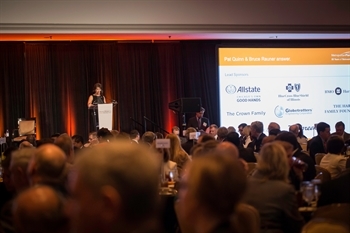
MPC President MarySue Barrett addresses 1,000+ attendees at the start of our Annual Luncheon.
Photo by Tricia Scully
During election years, MPC hosts candidates for public office and asks them specific, pointed questions about their positions on key issues. Questions this year touched on public finances, transportation funding, flooding, housing and government efficiency.
The event generated plenty of media buzz, and you can see and hear coverage of our luncheon at Crain’s Chicago Business, Chicago Tribune, Chicago Sun-Times, Daily Herald (paywall), Capitol Fax, NBC’s Ward Room blog, Times of Northwest Indiana, WBEZ’s Afternoon Shift, CBS and FOX.
In the weeks leading up to the luncheon, we invited national and regional experts, like Robert Puentes of Brookings Institution and Madeleine Doubek of Reboot Illinois, to weigh in on each of these topics. You can find links to their provocative responses at the bottom of this post.
The candidates differed on certain points—Rauner said he had to look up the word bioswale, while for Quinn it rolled off the tongue—but they also agreed on some things, such as performance measures to prioritize transportation investments. Here are the questions we asked, complete with infographics projected at the event, and the candidates’ responses:
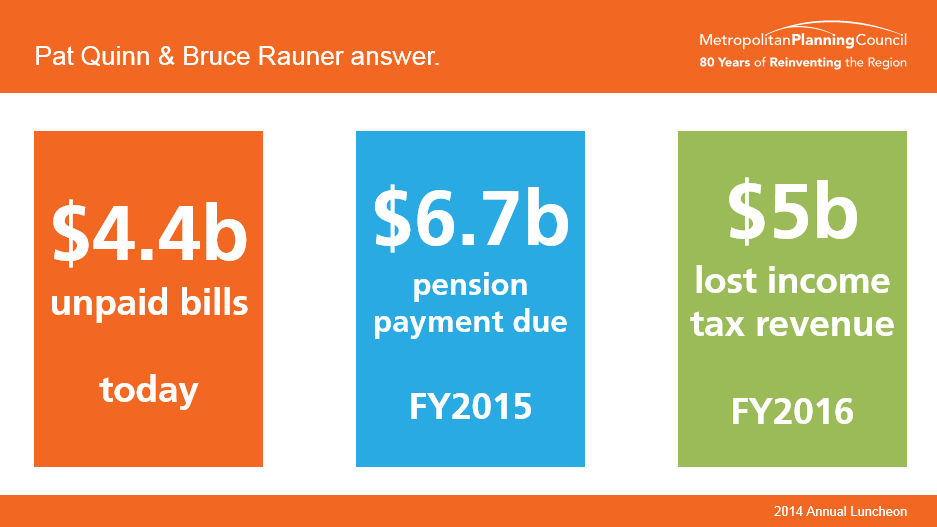
What are your specific ideas for new revenues as well as cuts in spending to address both the budget gap and deficit?
Rauner emphasized that raising income taxes would make things harder for working families. Instead, he suggested broadening the sales tax base—taxing some services as many neighboring states already do. He also said he would gradually rolll back income tax rates to their pre-2010, levels.
Quinn chose to focus on pensions, noting that he doesn’t support a 401k system as Rauner does for new hires. He also stated that residents should be taxed based on their ability to pay and criticized Rauner's support of a sales tax on consumption as “regressive.” Quinn said he was in favor of a "fair tax" system based on income levels.
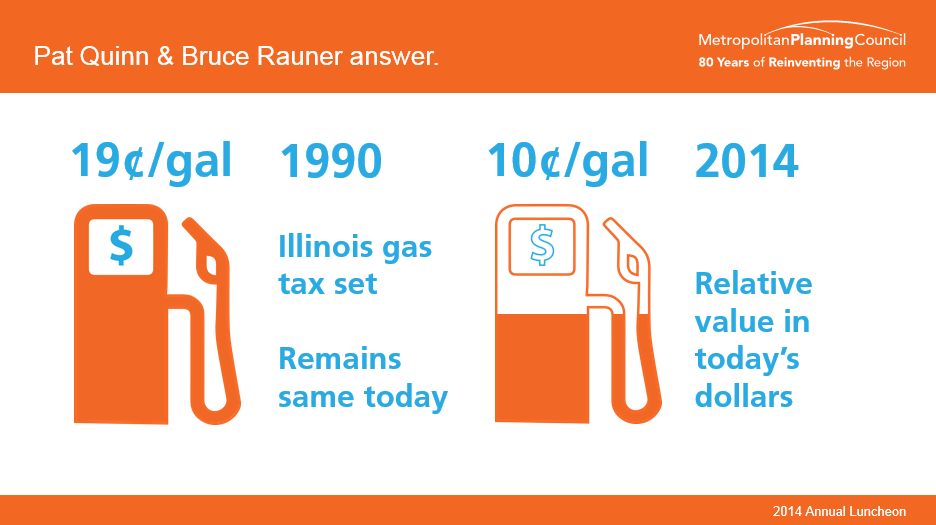
Do you support raising Illinois’ gas tax? If not, what new revenues do you propose to dedicate to transportation infrastructure, if any?
Both Rauner and Quinn are against raising the gas tax. Rauner believes raising the tax would hurt Illinois' competitiveness. He suggested “looking creatively at every opportunity for public-private partnerships,” and maintained that infrastructure should be part of the state budget every year—with only major projects depending on bonded debt.
Quinn highlighted the Illinois Jobs Now program, which he said has invested $31 billion in transportation projects since 2009 but has relied on other revenue. He referred to the gas tax as a “regressive levy,” and pointed to closing business tax loopholes for a solution to the infrastructure funding problem.
Both candidates supported using performance measures to make more informed, proactive decisions about transportation investment. Examples of performance measures at work could be prioritizing new road or transit projects that measurably improve access to jobs, reduce air pollution and spark nearby economic development.
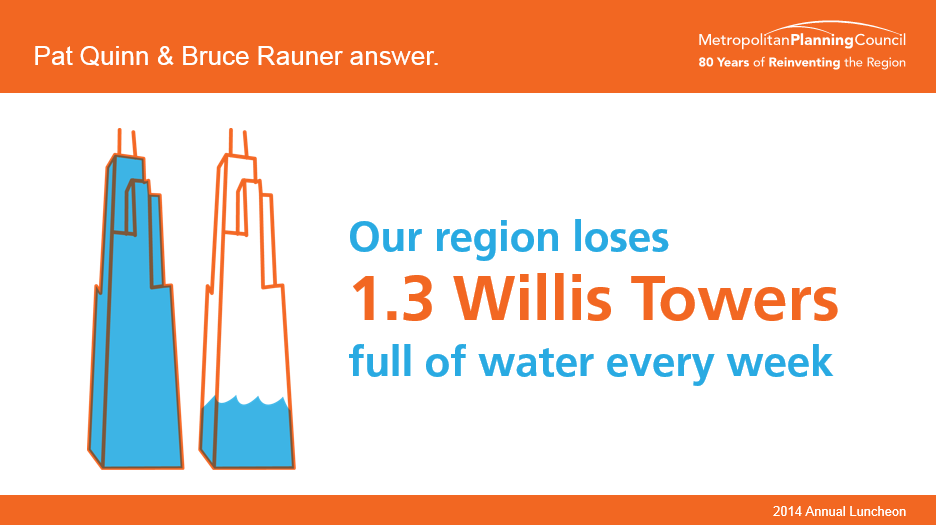
What can the state do to more efficiently direct dedicated and new revenues to repair and replace traditional water infrastructure—pipes, pumps and sewers—and to reward communities that invest in “green” infrastructure, such as green roofs and bioswales?
The candidates’ responses were quite similar for this question. Rauner talked about creative solutions for flood mitigation, taking advantage of the federal money available through the State Revolving Loan Fund and other sources, and working with local governments on modernized planning and zoning. He suggested using tax incentives to encourage property owners to add elements of green infrastructure to their land.
Quinn brought up the bill he recently signed to allow the Clean Water Initiative to invest in green infrastructure. And he pointed out the rain barrels at the governor's mansion and his partnership with the Center for Neighborhood Technology promoting rain barrels and gardens at schools.
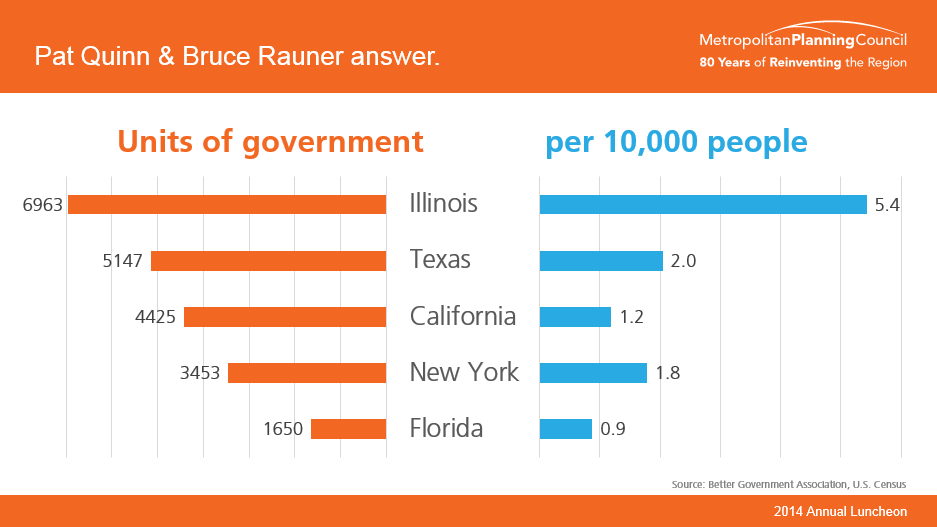
What is your plan to improve the efficiency and quality of local government service delivery, and to get to the right number of local governments in Illinois?
Rauner pointed out that Illinois has roughly 7,000 units of local government—almost 2,000 more than the next state, Texas, and double the average number. He talked about forming a task force to "rationalize the structure of layers of government in the state," and conveyed his expectation for quick results.
Quinn targeted school districts in particular, stating that it might make sense to consolidate them. "Local government is very important," he said. "We want to make sure they're delivering." He also pointed out the recent success with the Accountability Consolidation Transparency Initiative in DuPage County, led by County Board Chairman Dan Cronin and aided by state legislation.
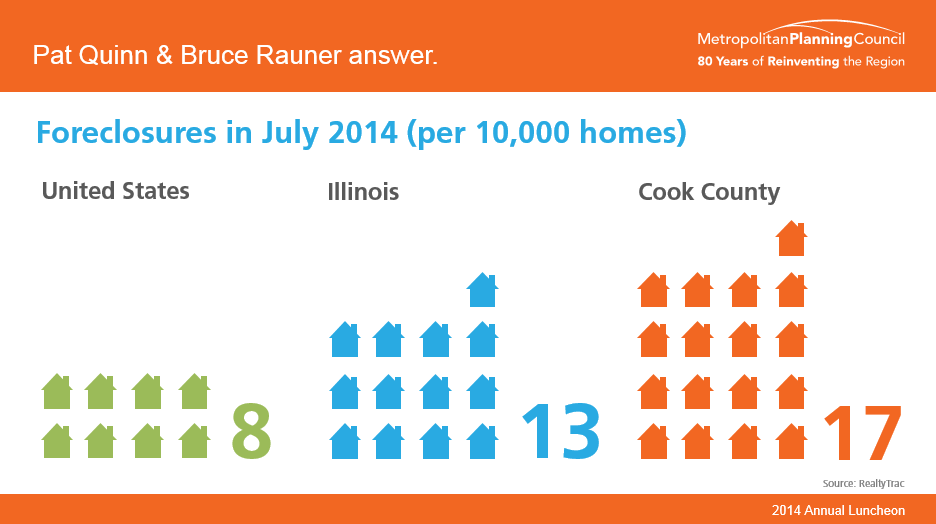
In light of declining state and federal resources for housing, social services and community development, how would you allocate resources to ensure affordable housing investment in both profitable markets and those that are distressed?
Rauner said "I'm a believer in planning," and pointed out the importance of planning affordable housing near high-quality transit that gets workers to jobs. He also lauded the idea of tax incentives for developers who designate a certain number of units as housing.
Quinn pointed to the work of the Ill. Housing Development Authority and its initiatives to increase housing for people with disabilities. He highlighted the Welcome Home Illinois initiative, which provides downpayment assistance for those first-time buyers looking to own a home.
The event’s non-debate format allowed each candidate to explain his beliefs on these critical regional issues in depth. It provided them with a rare opportunity to focus 25 minutes on their policy plans for Illinois in front of a packed room of influential leaders in the Chicagoland region, and we at MPC were thrilled to host them. We look forward to working with Illinois’ next governor on all of these tough issues and more. Thank you to everyone—from our Presenting Sponsor, PNC Bank, to those who ensured the event ran smoothly—for making our 2014 Annual Luncheon a success!
To learn more about where key regional and national players fall on these issues, check out our Answers 2014 blog series: